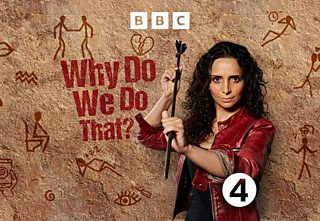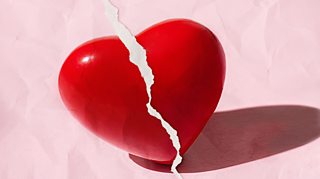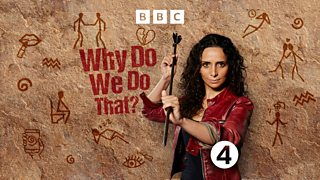Why Do We Kiss?
In the third episode of Radio 4's Why Do We Do That?, Ella Al-Shamahi looks at why we kiss. Is it as universal as we think? What is its significance to our romantic life? Is kissing a biological urge deeply embedded in our DNA, or is making out a learnt cultural thing picked up from a million movies?
Helping Ella to get closer to the value of “the snog” are Radio 1 Life Hacks Presenter Katie Thistleton and Dr Rafael Wlodarski.
Pucker up for six key facts about kissing…

1. The first recorded kiss is from 9000 B.C.
The first written record of a kiss is from around 1500 B.C., found in Sanskrit scriptures from India. They describe people sniffing or touching each other with their mouths.

80 million bacteria are exchanged in a 10-second kiss.
However, a much earlier depiction of embrace comes from around 9000 B.C., a carving called the Ain Sakhri lovers, found in caves near Bethlehem. The couple shown are engaged in what looks like sexual intercourse and their mouths are touching.
2. It is not a global phenomenon
We might think of kissing as a standard expression of romance and desire but, in 2015, a group of anthropologists in Nevada and Indiana did a huge survey of 168 different cultures from around the world and concluded that lip-to-lip romantic kissing was seen in only 46% of them.
Ella didn’t have her first kiss until her arranged marriage, and her upbringing sheds some light on some cultural resistance towards kissing. “I was brought up in an extremely conservative Muslim community, so if a rom-com was on the TV and one of the Hollywood Jennifers was going in for a kiss, someone older would literally lunge at the remote control!”
“My mum and aunts grew up in a Yemeni village and they were once chased up a tree by an angry camel. So, clearly, they've seen a lot of stuff, and yet I'm almost certain that they had never seen a romantic kiss.”
3. Kissing changes the microorganisms in your body
The intimacy of kissing doesn’t always sound romantic. Ella says that some scientists have likened kissing to two people spitting into their hands and then offering it out to each other.
It’s a fitting analogy, as 80 million bacteria are exchanged in a 10-second kiss. If you were to kiss your partner about nine times a day, you’d end up with very similar bacterial make-up or oral microbiomes, as they are known.
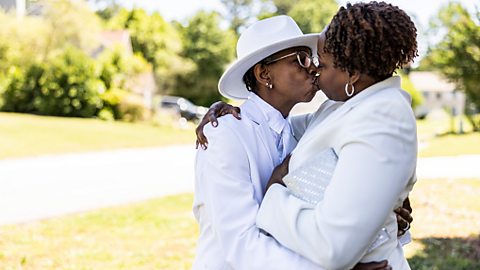
"It helps you select a potential mating partner"
Dr Rafael Wlodarski explains the science of kissing.
4. Regular kissing is the best sign of a good relationship
Researchers at Oxford University have used no fewer than 15 different methods to try and understand why people kiss. “One of the things we asked was how frequently you kiss with your partner,” says Dr Rafael Wlodarski, “and we also looked at the relationship quality of that particular partnership.” The team found that kissing was a better indicator of the health of a relationship than the frequency of sex.
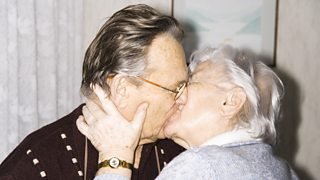
Kissing was a better indicator of the health of a relationship than the frequency of sex.
5. It is a key factor in compatibility
Another key finding of the Oxford team was that kissing is part of how people select a partner before they make a commitment. The reason behind that is smell.
“By and large, the most important part of kiss is to do with the smell,” says Dr Wlodarski, adding that “people find the smell of someone who is genetically compatible to them, more attractive than the smell of someone who isn't genetically compatible.”
This is borne out by Katie Thistleton’s own experience. “I get this completely,” she says, “I've only loved the smell of a guy since I've been with my husband. I love the smell of his breath - even in the morning! And I never did with ex-boyfriends. So, I honestly think that true love is like loving someone's smell!”
6. Kissing is both biological and cultural
Kissing clearly seems to be driven by biology. However, Dr Wlodarski arrives at a split decision overall. “I think the imperative to be that physically close and intimate with someone is biological for sure, but I think the expression of that imperative is quite cultural… whether it's romantic mouth-to-mouth kissing, nose rubbing, smelling or inhaling or biting or licking or any of these other many types of kisses.”
Of course, everyone has their own preferences, and Katie leaves no one in any doubt about hers: “No one needs to put the tongue in someone else's mouth. That's not necessary!”
More from Βι¶ΉΤΌΕΔ Radio 4
-
![]()
The Why Factor: The Kiss
Charlotte McDonald explores if kissing is the universal trait that people believe it to be.
-
![]()
Six things we learned about heartache from Why Do We Do That?
Ella Al-Shamahi examines the facts and feelings around heartbreak.
-
![]()
Why do we take risks?
Ella Al-Shamahi investigates why we take risks.
-
![]()
Why Do We Do That?
Ella Al-Shamahi investigates the origins of everyday human habits and behaviour.
